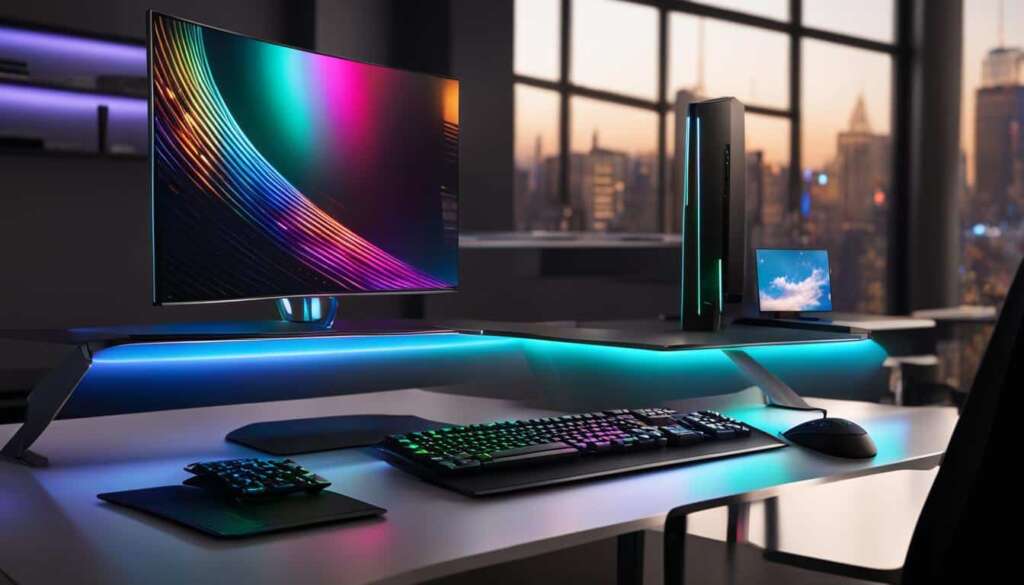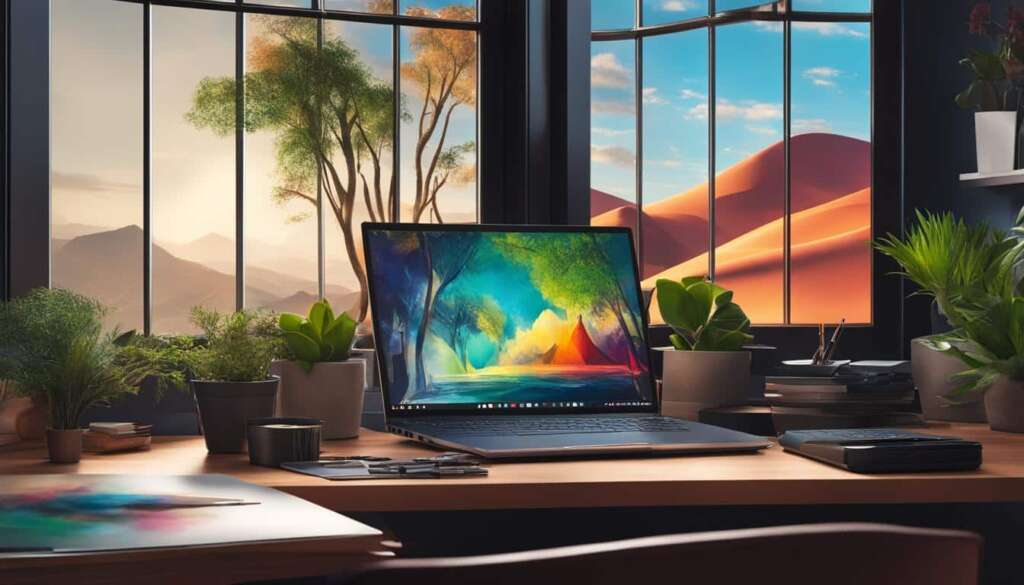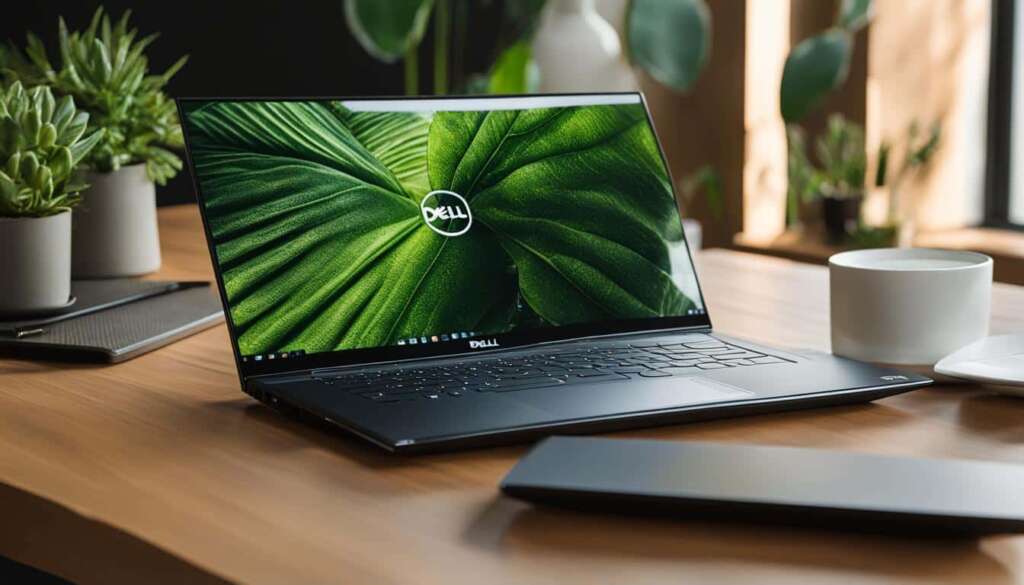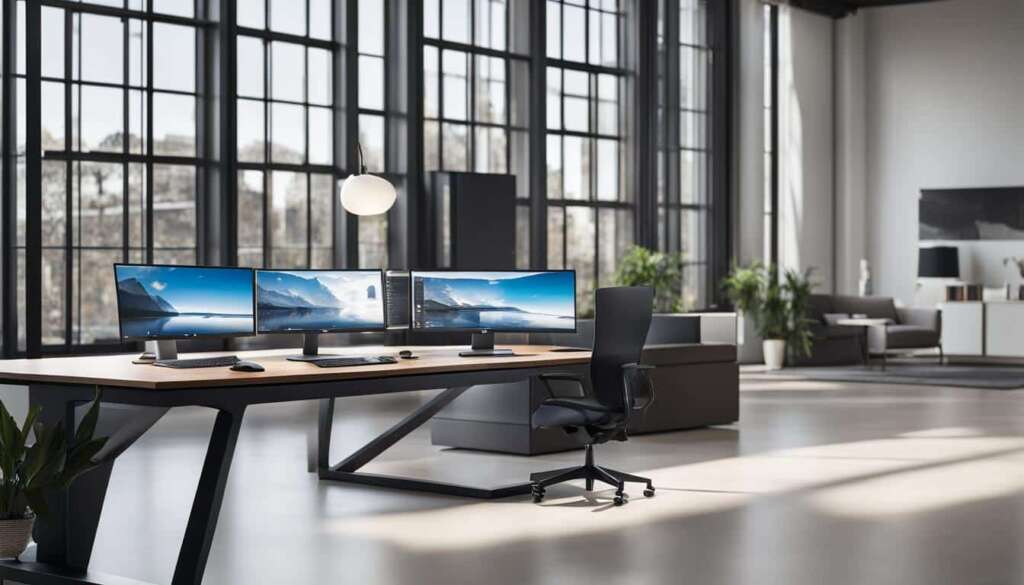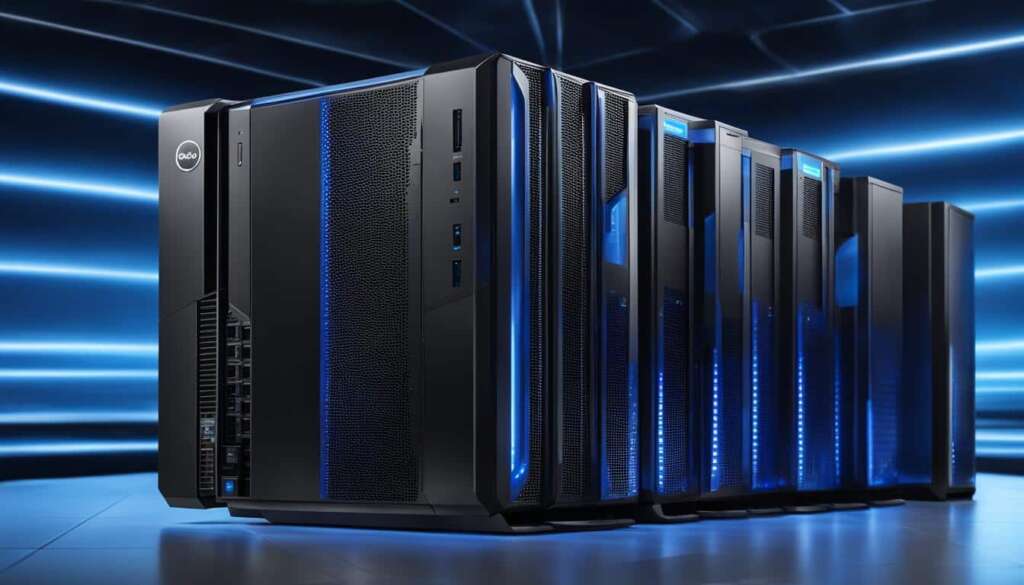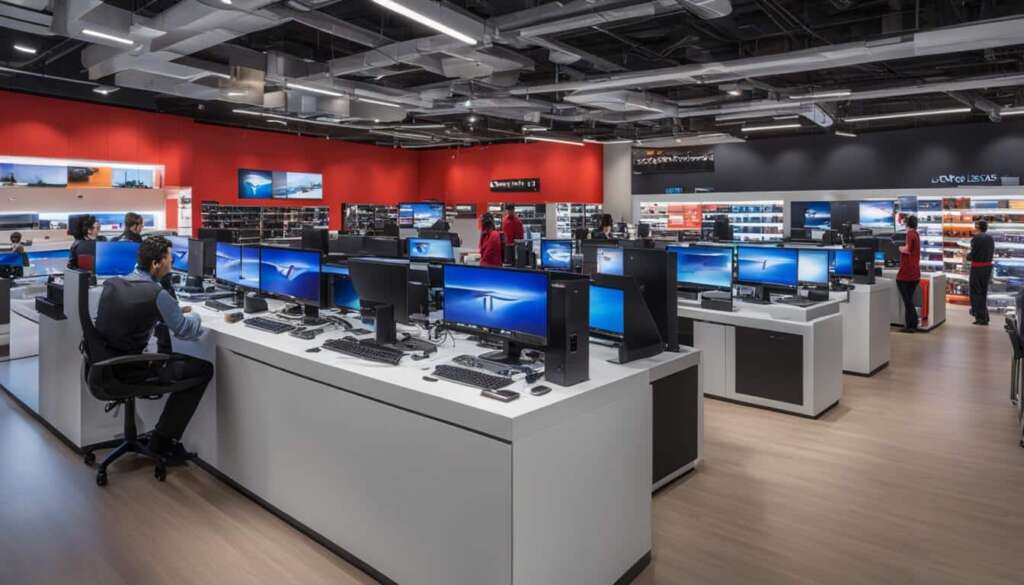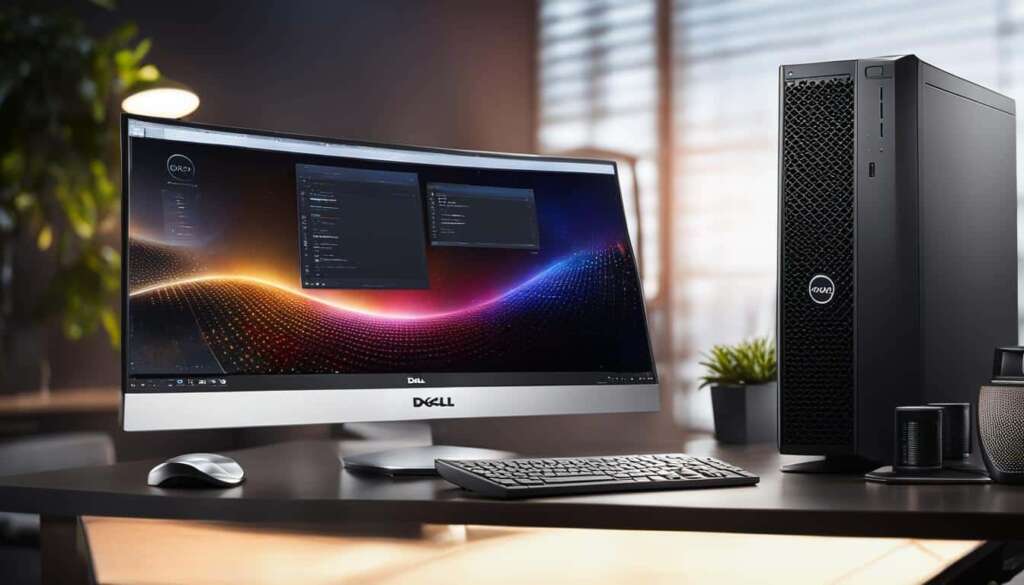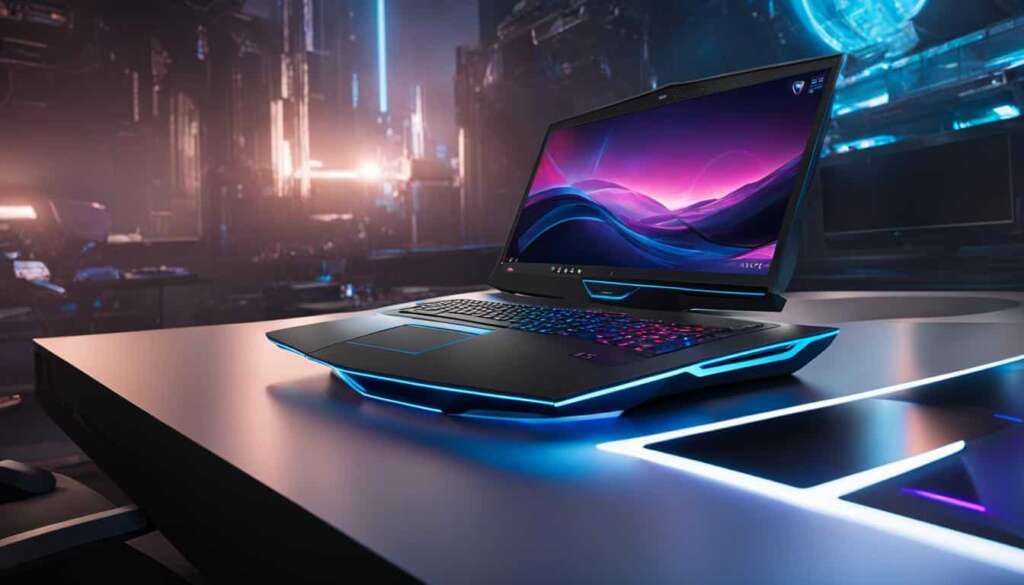Table of Contents
Welcome to our guide on the best desktop computers for 2023. Whether you’re a gamer, professional, or casual computer user, finding the perfect desktop computer that combines performance and reliability is essential. In this article, we will highlight the top-rated desktop computers that meet these criteria, ensuring you make an informed decision for your computing needs.
Affordable Desktop Computers
When it comes to finding an affordable desktop computer, there are several brands that offer reliable options at a budget-friendly price. Brands like Acer, Asus, Dell, and HP have models priced between $500 and $600, making them ideal choices for users who require a basic Windows 11 machine without breaking the bank.
These affordable desktop computers offer reliable performance for general use and come with specifications that cater to everyday computing needs. With Intel Core i5 or AMD Ryzen 5 processors, integrated graphics, 16GB of RAM, and 512GB or larger SSD drives, these desktops ensure smooth multitasking and speedy data access for everyday tasks.
Additionally, these affordable models come packed with essential features, including Wi-Fi and Bluetooth connectivity, multiple USB ports, and even the option to add a video card for enhanced graphics performance. This makes them versatile enough to handle a range of tasks, from web browsing and productivity applications to multimedia consumption and light gaming.
For budget-conscious users, investing in an affordable desktop computer from reputable brands like Acer, Asus, Dell, or HP ensures a balance between cost and performance. These desktops provide a cost-effective solution for users looking to upgrade their existing machines or purchase a new computer without compromising on quality.
With these affordable desktop computer options, users can enjoy a reliable computing experience without breaking the bank. Whether you’re a student, professional, or casual user, these budget-friendly choices offer a great combination of affordability, performance, and essential features.
High-Performance Desktop Computers
When it comes to high-performance desktop computers, users have a multitude of options from various top brands. These powerful machines are designed to excel in demanding tasks such as gaming, video editing, and other resource-intensive applications. Equipped with advanced features and specifications, these high-performance desktop computers deliver exceptional speed, multitasking capabilities, and reliable performance.
One of the key components that contribute to the performance of these desktop computers is the processor. Brands like Intel offer powerful processors such as the Intel Core i7 or i9, while AMD provides their Ryzen series processors, enabling fast and efficient computing. These processors are optimized to handle complex tasks with ease, ensuring a smooth and seamless user experience.
The graphics card is another vital component of high-performance desktop computers, enabling stunning visuals and smooth gameplay. Nvidia’s RTX series and AMD’s Radeon RX graphics cards are renowned for their exceptional performance and ability to handle demanding graphics-intensive tasks. With these powerful graphics cards, users can enjoy immersive gaming experiences and seamlessly edit videos or create 3D renderings.
To complement the powerful processors and graphics cards, high-performance desktop computers come equipped with ample memory and storage options. With a minimum of 16GB of RAM, these machines can handle multiple applications simultaneously, ensuring smooth multitasking capabilities. Additionally, spacious storage options such as 1TB or larger SSD drives provide ample space for storing large files, games, and multimedia content.
Top brands in the industry, including Acer, Asus, Dell, HP, and more, offer a range of high-performance desktop computer models that cater to different user needs and preferences. These models incorporate cutting-edge technology and innovative designs to deliver exceptional performance and reliability.
Reliable Desktop Computers
When it comes to reliability, certain brands stand out in the desktop computer market. Brands like Dell, Apple, and Lenovo have a reputation for producing reliable desktop computers that are built to last. These brands use high-quality components and undergo rigorous testing to ensure the reliability and durability of their products. Customers can trust these brands to deliver desktop computers that offer long-term performance, minimal downtime, and excellent customer support.
Table: Comparison of Best Desktop Computer Brands
| Brand | Reliability | Customer Support |
|---|---|---|
| Dell | ✓ | ✓ |
| Apple | ✓ | ✓ |
| Lenovo | ✓ | ✓ |
These reliable desktop computer brands have proven themselves in the market and have a track record of producing high-quality desktop computers that meet the expectations of users. Whether you’re a professional, a student, or a casual user, investing in a reliable desktop computer from these trusted brands ensures peace of mind and a smooth computing experience.
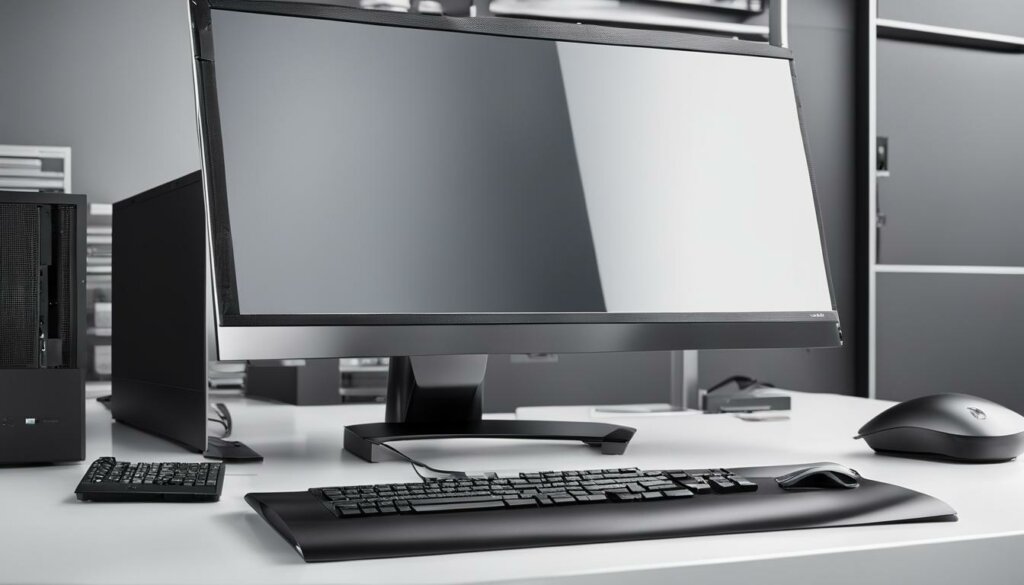
Having a reliable desktop computer is essential for uninterrupted work, gaming, or entertainment. Trusting established brands like Dell, Apple, and Lenovo allows you to focus on your tasks without worrying about frequent breakdowns or performance issues. Their commitment to quality and customer satisfaction makes them the top choices for anyone seeking a dependable desktop computer.
Desktop Computer Operating Systems
When it comes to desktop computers, the choice of operating system plays a crucial role in determining the user experience and functionality. The most prevalent operating system in the desktop computer world is Microsoft Windows. It offers a familiar interface and a wide range of software compatibility, making it the go-to choice for the majority of desktop users.
However, Apple’s desktop computers, including the iMac, Mac Mini, Mac Studio, and Mac Pro, feature the proprietary MacOS. Built specifically for Apple hardware, MacOS delivers a seamless and optimized user experience, with features like Siri, iCloud integration, and the ability to sync seamlessly with other Apple devices.
Another operating system to consider is Google ChromeOS, predominantly found on Chromeboxes. ChromeOS is designed for users who primarily rely on web-based applications and cloud storage. It offers a lightweight and secure environment, perfect for users who spend most of their time on the web.
Each operating system has its own unique features and applications, catering to different needs and preferences. It’s important to evaluate your requirements and consider factors such as software compatibility, user interface, and ecosystem integration when selecting the operating system for your desktop computer.
Desktop Computer Graphics
Desktop computers rely on various graphics processors to handle the rendering and display of visual content. These graphics processors play a critical role in delivering an immersive and visually stunning experience. Let’s explore the two main types of desktop computer graphics: integrated graphics and discrete graphics.
1. Integrated Graphics (iGPU)
Integrated graphics, also known as iGPU, are built-in graphics processors that share resources with the CPU. They are typically found in entry-level and mid-range desktop computers. Integrated graphics provide sufficient performance for basic tasks such as web browsing, word processing, and productivity applications. While they may not deliver the same level of performance as discrete graphics, they are cost-effective and energy-efficient.
2. Discrete Graphics (dGPU)
Discrete graphics, or dGPU, refer to separate graphics processors with dedicated memory (VRAM). These processors are specifically designed to handle graphics-intensive tasks, making them ideal for gaming, video editing, 3D modeling, and other demanding applications. Discrete graphics cards offer superior performance, providing smooth frame rates, realistic visuals, and enhanced details. They are equipped with their own dedicated memory, allowing for faster data processing and rendering.
Two major players in the graphics processor market are Nvidia and AMD. Nvidia’s GeForce RTX series and AMD’s Radeon RX series are popular choices among gamers and professionals. Both manufacturers offer a range of graphics cards tailored to different needs and budgets. Additionally, Intel recently introduced its Intel Xe graphics, which provide competitive performance in the integrated graphics segment.
An image related to desktop computer graphics:
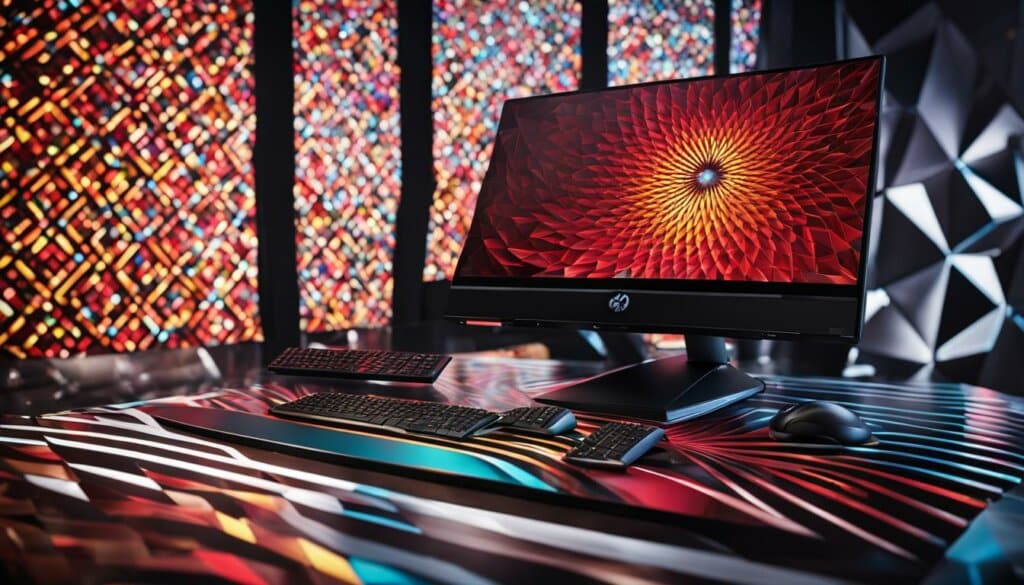
In summary, desktop computer graphics play a crucial role in delivering a visually captivating experience. Integrated graphics offer cost-effective solutions for general computing tasks, while discrete graphics provide superior performance for gaming and intensive applications. Nvidia, AMD, and Intel Xe are the leading players in the graphics processor market, each offering a range of options to meet diverse user requirements and budgets.
Desktop Computer Memory and Storage
When it comes to desktop computers, having sufficient memory (RAM) and storage is essential for smooth operation and optimal performance. Let’s take a closer look at these two crucial components.
Memory: RAM for Enhanced Multitasking
Random Access Memory (RAM) plays a key role in how quickly your desktop computer can process data and handle multiple tasks simultaneously. With ample RAM, you’ll experience seamless multitasking capabilities and a significant boost in overall performance.
For the best computing experience, we highly recommend a minimum of 16GB of RAM. This amount of memory allows you to run demanding applications, handle resource-intensive tasks, and effortlessly switch between programs without experiencing sluggishness or lag.
Storage: Embracing the Speed of SSD
In recent years, solid-state drives (SSDs) have revolutionized desktop computer storage. Unlike traditional hard drives, SSDs use flash memory technology, resulting in lightning-fast read and write speeds, improved reliability, and silent operation.
For most users, a minimum of 512GB of SSD storage is sufficient to accommodate the operating system, applications, and personal files. However, if you work with extensive media files, frequently download large games, or require ample storage for your creative projects, opting for larger capacities such as 1TB or more is recommended.
It’s worth noting that SSDs not only offer faster performance but also contribute to improved energy efficiency, reduced heat generation, and enhanced durability compared to their mechanical counterparts.
Upgrade Options for Memory and Storage
Flexibility is a crucial consideration when choosing a desktop computer, and ensuring the ability to upgrade memory and storage provides future-proofing and room for expansion.
When selecting a desktop model, inquire about the upgrade options for both RAM and storage. Some desktop computers allow easy access to slots for additional memory or have spare slots to accommodate future upgrades. Similarly, check if the storage bays can support additional drives or larger capacities, providing you with the freedom to scale up as your needs evolve.
Investing in a desktop computer with upgrade options allows you to customize your system to meet your changing requirements, prolonging its lifespan and ensuring it remains capable of handling future demands.
The Perfect Balance: RAM and SSD
To achieve the perfect balance of performance and storage, it’s recommended to combine ample RAM with a speedy SSD. This powerful combination ensures speedy multitasking, quick application launches, and fast data access, providing you with a superior computing experience.
| RAM | Storage | |
|---|---|---|
| Minimum Recommendation | 16GB | 512GB SSD |
| Advanced Recommendation | 32GB or more | 1TB or larger SSD |
By choosing a desktop computer with ample RAM and a speedy SSD, you’ll unlock the full potential of your system and enjoy seamless performance for both everyday tasks and resource-intensive applications or games.
Conclusion
In conclusion, the year 2023 presents a plethora of options when it comes to finding the best desktop computer. Whether you are seeking an affordable desktop computer for general use or a high-performance machine for gaming and demanding tasks, renowned brands such as Acer, Asus, Dell, HP, Apple, and Lenovo offer an array of top-rated desktop computers to choose from.
When making your decision, it is crucial to consider factors like your budget, specific performance requirements, and intended use cases. By selecting a reliable brand and taking into account elements such as operating system, graphics, memory, and storage, you can find the desktop computer that perfectly aligns with your needs and elevates your computing experience to new heights.
Remember to explore desktop computer reviews and rely on the best desktop computer brands for a seamless and reliable computing experience. Whether you need a fast and powerful desktop computer or an affordable yet reliable option, the market offers top desktop computer models suited for every requirement. Stay informed, compare different models, and make an informed decision to ensure you bring home the best desktop computer that meets your unique needs.
FAQ
What are the top picks for the best desktop computer in 2023?
The top picks for the best desktop computer in 2023 offer a combination of high performance and reliability. These top-rated desktop computers are highly recommended for their powerful hardware, customizable features, and sleek designs.
Are there affordable desktop computer options available?
Yes, there are affordable desktop computer options available. Brands like Acer, Asus, Dell, and HP offer models priced between $500 and $600. These desktops provide reliable performance for general use and come with specifications such as Intel Core i5 or AMD Ryzen 5 processors, integrated graphics, 16GB of RAM, and 512GB or larger SSD drives.
Which desktop computers are considered high-performance?
There are various desktop computers available for high-performance needs. These top desktop computer models come with advanced features and specifications that make them suitable for gaming, video editing, and other demanding tasks. They typically have powerful processors such as Intel Core i7 or i9, Nvidia RTX or AMD Radeon RX graphics cards, 16GB or more RAM, and spacious storage options like 1TB or larger SSD drives.
Which desktop computer brands are considered reliable?
Brands like Dell, Apple, and Lenovo have a reputation for producing reliable desktop computers that are built to last. These brands use high-quality components and undergo rigorous testing to ensure the reliability and durability of their products.
What are the different desktop computer operating systems available?
Desktop computers utilize different operating systems, with the most common choice being Microsoft Windows. Apple’s iMac, Mac Mini, Mac Studio, and Mac Pro desktops feature Apple’s MacOS, which offers a different user experience. Google’s ChromeOS is found on the occasional Chromebox offering. Each operating system has its own unique features and applications, so it’s important to choose the one that best suits your needs and preferences.
What are integrated graphics and discrete graphics in desktop computers?
Integrated graphics (iGPU) are built-in graphics processors that share resources with the CPU. They are suitable for basic tasks like web browsing and productivity applications. Discrete graphics (dGPU) are separate graphics processors with dedicated memory (VRAM) that provide superior performance for tasks like gaming and video editing. Major graphics processor manufacturers include Nvidia, AMD, and Intel Xe, each offering a range of options to cater to different needs and budgets.
How much memory and storage do I need in a desktop computer?
A minimum of 16GB of RAM is highly recommended for optimal performance and multitasking capabilities. Storage options have shifted towards faster solid-state drives (SSDs) rather than traditional hard drives. A minimum of 512GB of SSD storage is suitable for most users, while larger capacities like 1TB or more are recommended for users with extensive media or game libraries.
What should I consider when choosing a desktop computer?
When choosing a desktop computer, it’s important to consider factors such as budget, performance requirements, and specific use cases. By choosing a reliable brand, considering factors like operating system, graphics, memory, and storage, users can find the best desktop computer that meets their needs and delivers an exceptional computing experience.

